|
American policy is based on the idea that to give unmerited attention to unofficial feelers will lead Jap militarists to believe the U.S. would actually accept terms short of unconditional surrender. |
 Vol. III No.36 Delhi, Thursday, May 24, 1945 Reg. No. L5015
Vol. III No.36 Delhi, Thursday, May 24, 1945 Reg. No. L5015
|
|
Consolidation of India-Burma Theater headquarters and Services of Supply Headquarters was carried into effect this week, with Lt. Gen. Dan I. Sultan, Theater Commander, taking over responsibilities and functions of SOS.
To the United States for a new and important assignment with the War Department went Maj. Gen. W. E. R. Covell, since November, 1943, Commanding General of SOS.
The consolidation has been continuing for the last several months, with the purpose of effectuating a more efficient administrative unit and releasing personnel urgently needed elsewhere.
The mission of the I-B Theater remains unchanged.
Sultan explained it thusly in a speech to his troops on the successful completion of the Stilwell Road:
HELP TO CHINA
"Our most important mission will continue to be the giving of maximum support to China. Every vehicle, every ton of supplies rendered to China will aid in licking the Japs. That is our job; one of which we can be proud; one which we have already proved we can do."
Upon assuming command of SOS, Covell faced a pressing supply problem. The long supply line from the U.S. and the few ships available to operate it made imperative the efficient operation of the Theater's ports. Turnaround time of ships had to be reduced to the lowest possible minimum.
CALCUTTA TOP PORT
Calcutta was the most important port, because it handled approximately 85 percent of the war materials coming into India. First under Maj. Gen. Gilbert X. Cheves, later under Brig. Gen. Robert R. Neyland, the bottleneck that was Calcutta was developed into the best port in the American supply system.
Four months after Covell's arrival in India, the arrival of U.S. railway battalions broke another bottleneck - the meter gauge Bengal & Assam Railway, vital lifeline for troops operating in Assam and North Burma. In their first year of operation, American troops increased the railway's carrying capacity by more than 100 percent.
At the same time, the British and Indians increased the carrying capacity of the broad gauge railroad and barge lines linking Calcutta's docks to the Bengal & Assam Railway.
Under Covell, the incredible network of pipelines which stretched to China in April, 1945, was started in December, 1943. This system supplied installations in northern Burma and India, released valuable space for other material. British, Americans and Indians functioned smoothly as an Allied team along the Line of Communications.
The Stilwell Road forged ahead with the increase in deliveries of supplies and in January, 1945, it was completed and the first convoy rolled across the Chinese border to break a land blockade that had throttled China since march, 1942, with the capture of Rangoon.
Covell, No. 1 honor graduate of the West Point class of 1915, has experienced a typical Army Engineer's career, broken by a temporary return to civilian life (May, 1940, to June, 1941) as General Manager of the Crossett Arkansas Industries, largest manufacturing concern in Arkansas.
In World War I, Covell was in the G-3 Section of the First Army, under Gen. George C. Marshall. Later, he became G-3 of the Second Division. From 1933 to 1936, the general was Assistant Engineer, charged with maintenance of the Panama Canal. From 1936 to 1940, he was District Engineer at Pittsburgh, where he instituted and carried out a large flood control program.
Returning to active duty in June, 1941, Covell was appointed Division Engineer, Caribbean Division, Caribbean Defense Command. Immediately before being assigned to India, he was Director of the Fuels and Lubricants Division of the Quartermaster General's Office in Washington, responsible for the purchase and distribution of all Army gasoline and liquid fuels except aviation gas.
|
'UP FRONT WITH MAULDIN'
ALONG THE STILWELL ROAD - For the best hunting in North Burma, G.I.'s along the famous Stilwell Road go "Up Front With Mauldin." Not justly famed, Pulitzer prize-winning cartoonist Bill maudlin of ETO, but his older brother, Cpl. Carl Mauldin, stationed in the jungle with Army Air Corps Communications Service.
During his year in the I-B Theater, Mauldin has devoted most of his spare time to hunting. Among his kills are an eight-foot tiger weighing 770 pounds, deer, squirrel, wild boar, orangutan and monkeys.
During a recent hunting trip, Mauldin shot a monkey. While dressing it, he saw that he had killed an expectant monkey. He immediately performed a caesarian operation and brought to life the tiniest monkey ever seen in North Burma. The baby, christened "Sparky," was kept in a home-made incubator and fed from an eye-dropper. Mauldin passed out cigars to celebrate the birth.
His buddies kid the corporal about his lack of ability as an artist. "I can beat Bill hunting, but I can't draw anything but a bead on a target," Mauldin says. "Brother was always full of the devil. I never dreamed he would become a famous artist."
AWOL ATC JEEP IN ETO
Transportation officers at ATC Headquarters were non-plussed the other day to learn that one of their jeeps had been discovered bouncing around ETO pursuing Nazis rather than facing the rigors of I-B Theater roads.
This information was disclosed in a letter received from the Provost marshal, Seine Sector, ETO.
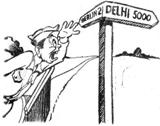
|
Matters became more complicated when ATC Headquarters Adjutant, after a quick roll call, declared that "non of our jeeps is missing."
The ETO Provost Marshal, however, insisted upon being a paragon of honor. He replied firmly that the jeep was "plainly marked" with the designation of the ATC unit.
The bewildered, harassed Adjutant finally hit upon a solution. "Because of the vehicle shortage at this base," he wrote, "this organization imposes no objection to the assignment of the vehicle in question, provided suitable transportation can be arranged by your organization."
'HONOR' WINNER'S KIN AWARDED SILVER STAR
For gallantry in the same action for which his brother, the late Lt. Jack Knight, was posthumously awarded the Congressional Medal of Honor, 1st Sgt. Curtis L. Knight has received the Silver Star.
Knight was the First Sergeant of his brother's cavalry troop which fought as a part of the Mars Task Force in Burma.
After his brother was killed, Knight, "knowing there were no other officers available, with complete disregard for his own life, assumed the duties of troop executive officer and led an attack on a strong enemy position," the citation reads.
After being wounded, Knight continued to direct the attack from a stretcher, "not permitting himself to be evacuated until all other wounded were brought to safety."
MISSIONARY MEDIC IN 10TH AF
10TH AIR FORCE H.Q. - Physician, missionary, soldier, Capt. Lilburn I. Burroughs is in his fifth year in India-Burma, yet these years represent only an incident in the lifetime he plans to spend here.
Now flight surgeon of a 10th Air Force liaison group, Burroughs graduated from Baylor University in 1932 and was on his way to India aboard a Dutch vessel when the Germans declared war on the Netherlands. After dodging U-Boats most of the way the ship reached India and Burroughs continued to his Baptist mission in Banskandi, province of Cachar, in northeastern Assam.
He had no trouble in working up a practice. Patients with malaria, typhus, leprosy, roundworms, cataracts, filariasis, and cholera were waiting for him. Burroughs performed from 8 to 10 operations for cataracts each week, charging five rupees per patient. Half of his clientele, however, gave him just their gratitude.
When Jap troops threatened his mission in their attack on Imphal in the spring of 1944, Burroughs evacuated his children and became a British Army surgeon. Later, he was commissioned a captain in the United States Medical Corps and assigned to the 10th Air Force.
Burroughs was the first doctor to serve with a signal air warning crew. While at an outpost station on the northwest Burma-Assam border, east of Jorhat, he received a call to treat a paralyzed soldier deep in the north Burma jungles. After giving what instructions he could over the radio, he trekked 60 miles into unexplored headhunter territory to reach the patient. With two enlisted men and an interpreter and with Japs on three sides, Burroughs fixed the stricken soldier to a chair and made tracks for headquarters. Battling both monsoon rains and the constant threat of headhunters and Nips, they finally made their way back to civilization.
Since his assignment to the liaison outfit three months ago, Burroughs has devised a larger first aid drop kit for the treatment of more serious wounds. He also co-ordinates the work of air-jungle rescue teams.
BASE SECTION SETS MARKS
CALCUTTA - Five records in unloading, handling, and shipping of supplies were set in April by Base section and Base General Depot.
Depot set an all-time high mark in the shipping of supplies from Calcutta to bases in India, Burma and China, with a 38 percent increase over March.
Port Battalions of Base Section bettered their unloading record for a single day with 7,095 tons, set in a 22½-hour working day.
Rail tonnage over the Line of Communications to Assam increased 13 percent from Calcutta. Included was the greatest number of vehicles sent to Assam in any one month and a record amount of gasoline carried in the vehicles.
|
WON BY CHINESE
Roundup Staff Article
Foochow, invaded last week, has been completely occupied and Chinese nationalists troops are pushing enemy forces over Hunan Province's 1,500-foot hills toward the key Jap base of Paoching, which guards the key communications city of Hengyang. The drive on Foochow has already carried six miles past the treaty port.
Meanwhile, in a sudden offensive in Kwangsi Province, Chinese troops recaptured Hochih, important Jap bastion on the Kwangsi-Kweichow railroad. It was also announced that an American air base has been re-established at Kweiyang, 200 miles south of Chungking.
EAC Pilots Blast Nips In Burma
EAC HQ. - No rest has been given during the past week to disorganized Jap troops in Burma, attempting to get away to the east and south from territory where main north-south communications are in Allied hands.
Few big targets presented themselves, but closest watch is being kept for positions from which the enemy can be run out by bombing, gunning, and incendiary attacks.
Gun positions on the road from Thazi into Siam were bombed, Japanese trying to get away from the Arakan were attacked, the Pegu and Tiungoo areas were bombed and strafed.
Harassing strikes against Jap troops and stores dumps were made in lower Burma; south from Rangoon toward Moulmein strikes were made for three consecutive days.
Cutting of the railway to Singapore continued, and in an attack on the Andaman Islands, Hopetown station was destroyed.
LEDO ROAD PATCH LOST IN RED TAPE
Status of the proposed Ledo Road patch is still in the sweating-out stage.
Request to make the proposed patch official was long ago sent to Washington with the request that it be approved by the War Department, Theater Headquarters revealed this week.
To date, no reply to the approval request for the patch has been received, Theater Headquarters informed the Roundup.
|
Charles P. Rockwood, Office of War Information psychological warfare expert, won two rare distinctions this week when Lt. Gen. Dan I. Sultan personally decorated him with the Air Medal. The award was only the fifth presented to a civilian in the Theater during its three-year history, and the ceremony was considered significant enough to be attended by George Merrell, United States Commissioner to India.
Presented at the conclusion of the Successful Burma campaign, Rockwood's decoration was awarded for meritorious service with the Northern Combat Area Command during the past 18 months. He participated in 29 B-25 missions, and is credited with giving direct aid to the Marauder and Mars Task Force units in their respective advances from the Hukawng Valley to the Burma Road.
Rockwood's leaflet-dropping team was charged with the mission of relieving the news vacuum prevalent in the enemy-occupied territories of North Burma. Pinpoint dropping accuracy with newspapers printed in Burmese, Shan and Kachin languages brought the latest war developments to the natives and informed them that the Allies were returning to Burma in force.
In an effort to counteract the adverse effect the leaflets were having on their conduct of the war, the Japs imposed a severe penalty on anyone caught with American "propaganda." In several instances, native boys were hired to pick up and destroy the leaflets before they could reach the hands of the populace. According to Rockwood, however, these efforts were in vain.
The Japs had no facilities for counter measures, and except for various groups who came to the villages to give public utterance, little attempt was made to use the Allied method of getting the Jap version of the news to the villagers.
Yaleman Rockwood, from Geneva, Ill., who was a United Airlines navigator on the South Pacific run before arriving here in 1943, stated that the leaflets - dropped in numbers varying from 150 to 150,000 - had almost instantaneous effect in may cases. Before an American bombing was scheduled, it was customary where possible to inform the natives beforehand. Invariably, the villages would be evacuated within 24 hours.
Salt, needles, matches and seeds were also dropped to various hill and jungle villagers during the missions. These several items, along with the explanatory leaflets, are credited with saving the lives of a considerable number of distressed air crewmen, and with expediting the movement of the ground troops.
So eager were the natives to receive the latest news, that on one mission in the Ft. Hertz area the leaflets were dropped before the rice bags which were to come on the second pass over the dropping area. When the B-25 came over the second time, the rice made several direct hits on the scrambling Burma levies, almost resulting in fatalities. They changed the system after that and the rice was always dropped first - leaflets being lighter.
There comes the time, according to Rockwood, when even the best of plans fail to work out as scheduled. On a combination bombing and leaflet mission with the Eastern Air Command, the target was to be a gas dump. As luck would have it, however, the bombs fell a half mile from the target, and the Japanese gasoline was inundated with leaflets.
TOKYO ROSE LAUDS A-A BATTERY
HQ., EASTERN AIR COMMAND - Operating under the Combat Cargo Task Force, a 10th Air Force anti-aircraft battery recently was credited by Tokyo Rose, Japanese propagandist, as having been too much for the Jap Army in the Meiktila area.
"The reason that the Japanese were unable to retake Meiktila," said Tokyo Rose, "was because of strong American forces encountered there."
The "strong American forces" were a part of the battery which was supporting the 14th Army and the RAF regiment in their defense of Meiktila from Japanese counter-attack.
When the Japs were driven out of Meiktila early in March, the battery was the first airborne unit to reach the airstrip. Men of the battery fought Japs in the air by day and on the ground by night.
Sgt. William H. Lane, jr., medical corpsman, Everett, Mass., and Cpl. Richard E. Jones, gun squad leader of Woodvilla, Ala., rendered first aid to the wounded, exposing themselves to intense mortar and small arms fire.
|
ASSAM BASE - Tire retreads are keeping many of the trucks on the Stilwell Road from Assam to Kunming going when rubber shortages might otherwise put them on the "dead line."
New treads are being put on here by a G.I. Tire Repair Company, which takes worn and torn tires and tubes and turns them out as good as new.
Stack upon stack of old, beaten tires from jeeps, weapons carriers, command cars, and six-by-sixes are piled outside the crude basha workshops ready for processing.
The life of a tire is considerably shortened on the rough roads of Assam and Burma. Sharp rocks cut them to pieces. Steep grades wear down rubber more than twice as fast as it would be worn down on smooth Shangri-La highways.
Instead of relegating a worn out tire to the scrap heap, it is loaded upon a truck or railway car and sent to the tire repair outfit here. Within a few weeks, it is back on some other vehicle on The Road.
Capt. Sidney S. Groom, C.O. of the unit, has organized his men on a production line basis. His two shops work on three eight-hour shifts daily, and each man has his daily quota of tire to turn out.
MEN WORK STRIPPED TO WAIST
Hot molds which bake the tires raise the temperature in the shops to over 100 degree levels, but the men working on the production line, stripped to the waist, turn out repair jobs and retreads as fast as any factory of similar size in the States.
If a tire is too far gone, it is turned over to the salvage pile, but less than 15 percent of the tires are discarded. If there is anything to work with at all, the tire repair unit returns it to operational units.
After the inspector has determined just what has to be done, the tire moves on down the production line. Tires marked for retreading are sent into the buffing shop, where a G.I. operates a heavy mechanical rasp. The ragged edges of the tire are shredded off by this machine, and when it emerges from the operation it presents a uniformly smooth surface to which the retreading material can be attached.
next the "camel-back," a rubber strip which constitutes the new surface of the tire, is applied. On down the production line then, the tire goes into the mold, the final operation in the retreading process. Here it is heated to a temperature of 290 degrees Fahrenheit under pressure. They are as good as new after being taken from the molds two or three hours later, following cooling.
MAKES TIRE BETTER THAN NEW
According to Groom, who had his own automobile and tire agency in civilian life, the retread job which his unit does make a synthetic tire better than new. Rubber grown in India is used for the retreading, and it is considered as good as the rubber which once was obtained from the Dutch East Indies. Local rubber firms manufacture the various products which are needed, including the "camel-back" and cord material.
Many of the men in the unit are ex-tire men from the States. S/Sgt. Nick Malone, Akron, O., burly, rugged, handle bar-mustached, made tires in the Goodyear Rubber Company's factory before coming into the service. Almost all of the men of the unit have taken a two-month's Army course in tire repair work in the U.S.
Groom's company can retread an average of 4,000 to 5,000 tires a month and can top that figure in section repair jobs. Because of the long line of supply, they make repairs on tires which would normally be good only for the salvage pile. And they get thousands of miles of service from these tires which ordinarily would be classed as beyond repair.
 By SGT. CHARLES CLARK Roundup Staff Writer |
PEACE AND EXCITEMENT FOR CRASH BOAT CREW
|
Stationed upon the banks of the Brahmaputra River, a two-man crash boat crew of the Global Planesmen, famed I-B ASC Group, has a job that is sometimes (a) one of the most peaceful and (b) one of the most exciting in this neck of the war.
Sgts. William M. Thompson and David Webb, veterans of over two years overseas in Africa, Sicily, Italy, Burma and India, have been working together in their jungle crash boat retreat for over six months.
When there are few plane crashes in their area, the sergeant spend their time keeping their boat shipshape, improving their basha home and patrolling the normally-peaceful river. Life is idyllic, with good hunting and fishing.
There was a time when all types of planes were making crash landings on the river and its beaches and keeping the pair busy.
However, Thompson and Webb are not as active these days now that the Japs have been beaten southward in Burma.
But they still go out on occasional rescue missions with other crash boats on the river and look after the welfare of wandering G.I.'s, whether they be survivors of plane accidents or lost hunting parties.
There's no doubt that their job is still important.
 HIMALAYAN HILL STATION
HIMALAYAN HILL STATION
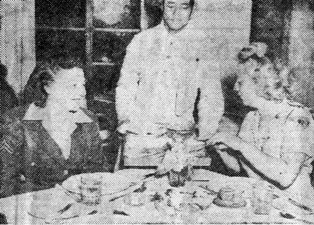 WAC Madeline A. Stone, of Cleveland, has dinner with Mary West of the British Women's Auxiliary Service at a British
hostel in Darjeeling.
WAC Madeline A. Stone, of Cleveland, has dinner with Mary West of the British Women's Auxiliary Service at a British
hostel in Darjeeling.
|
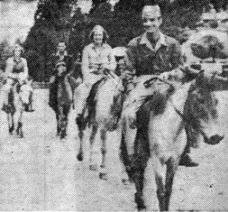 Pfc. Mildred McDonald, left, and Sgt. Geraldine Schech horseback ride along a foothill trail in the Himalayas.
Pfc. Mildred McDonald, left, and Sgt. Geraldine Schech horseback ride along a foothill trail in the Himalayas.
|
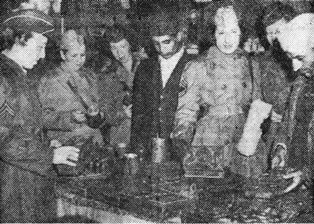 Curios for the folks at home are purchased by five WAC's from one of the many "trinket-wallahs" who display their wares in the bazaars.
Curios for the folks at home are purchased by five WAC's from one of the many "trinket-wallahs" who display their wares in the bazaars.
|
So agreed the comely bevy of WAC's stationed at Eastern Air Command and Army Air Forces HQ, I-B Theater, after a recent leave spent at Darjeeling, famous Indian hill station.
For these hard-working distaff G.I.'s it was a complete change from that of Army routine. Nothing to do but rest and relax in the foothills of the Himalayas, freed from the tedium of reveille, clacking typewriters and whirring fans.
Jumping off from Calcutta, the hill-bound detail traveled by train across the steaming plains and up the cool lower mountain ranges to a British hotel, similar to a YWCA summer camp Stateside.
DREAMS FULFILLED
Here their dreams were fulfilled. Their days were filled with walks and horseback rides along cool, rugged mountain trails; interesting hours were spent talking with service women of other Allied countries also taking leave periods at the hostel; visits were made to the shops of "trinket-wallahs" to buy Oriental curios.
One of the highlights of the trip was a visit to the famous Darjeeling tea plantations. They learned how the leaves are picked and prepared for shipment around the world.
Best of all was the sheer luxury of having many servants ready at a moment's notice to care for all their needs.
STIRRING REMARK
The Office of the Public Relations Officer concluded his stirring recital of the WAC leave with these glowing words:
"Most of the WAC's felt they would like to live forever like this, with Indian bearers serving them their breakfast in bed, bringing their laundry back, crisp and clean, the day it went out - all the little services that were on hand to make their vacation days complete."
Rest, it's wonderful.
|
EAC Planes In Record
HQ., EASTERN AIR COMMAND - USAAF, RAF and RCAF transports of the Combat Cargo Task Force flew a record-smashing 77,000 tons of airborne supplies into Burma in the month of April during the Rangoon operations, it was announced this week.
The aircraft compiled a total of 84,000 air hours in the period, despite treacherous monsoon weather. Heavy rains inundated seven forward fields, necessitating longer flights and use of alternate strips and thunderheads and air turbulence played havoc with pilots. One plane was torn apart in flight.
In addition to this outstanding aerial supply performance, Air Commando gliders of the CCTF took part in operations at Toungoo, Lewe and a field south of Pegu. Air Commando liaison planes flew 16,087 hours and evacuated approximately 5,000 casualties.
14th AF Pounds Retreating Japs
14TH AIR FORCE HQ. - Fighters and medium bombers of Maj. Gen. Claire Chennault's forces this week ripped savagely into retreating Japanese columns west of Paoching, inflicting heavy casualties and destroying large numbers of locomotives, rivercraft and trucks in low-level attacks on communications lines.
Fighter on the Hupeh-Honan-Hunan front killed an estimated 700 Japanese soldiers by strafing in two days. A single mission of P-47's later in the week, claimed 400 killed near Yangchi and one flight of P-51's over Shanmen accounted for 100.
Widespread attacks on railroads, rivers and roads knocked off 30 locomotives, 230 trucks and 117 rivercraft.
Meanwhile, figures from Washington revealed that the veteran "Flying Tiger" fighter group has shot down six Jap planes for each one of its own lost since it began operations in 1942. Their totals are 938 Jap aircraft destroyed, 345 probably destroyed and 482 damaged.
|
APOLOGY Maj. Gen. C. L. Chennault, CG of the 14th Air Force, wrote the Roundup repudiating a story published April 9 characterizing Maj. Stanley Wallace as being a "former AVG-er who had returned to the scenes of his early exploits at Lashio." Chennault declared Wallace had never been at Lashio as a member of the AVG, that he had in fact, resigned before any pilots were sent there. Roundup contacted 10th Air Force Headquarters whence the story originated. Word from 10th Air Force says simply that the Public Relations Officer of the outfit to which Wallace was attached misconstrued the facts. To old Roundup reader and AVG expert Chennault, a retraction, in justice to the memory of his gallant airmen who were at Lashio in April, 1942. |
COM-CAR LEADERS GET FLYING CROSS
EAC HQ - Brig. Gen. Frederick W. Evans, commander of the Combat Cargo Task Force, and Col. Charles M. Anderson, Task Force Chief of Staff, recently were awarded Distinguished Flying Crosses "for extraordinary achievement."
The awards were made by Maj. Gen. George E. Stratemeyer, commander of the Eastern Air Command, for flights over enemy territory in Burma.
ANACHRONISM
1311 BU, INDIA - Requisitioned in September for the cool Indian winter, 575 comforters arrived here this week in 110 degree heat. M/Sgt. Ernest S. Bingham, chief supply wallah, wasn't surprised. He's an old Army man.
MEMORIAL DAY - 1945
Editor, Roundup,
The following is submitted to the Roundup for publication on Memorial Day, May 30.
Yours for Victory,
PFC. GEORGE C. SMITH
|
|
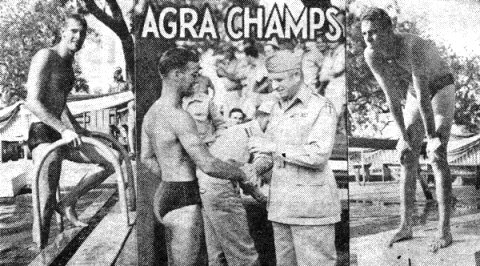 TOP MEN - Leaders in the India-Burma swimming championships at Agra recently piled up outstanding scores and reaped their rewards. Left is Lt. Freddy Worthen, who won four firsts and anchored his Photo Recon team which finished third in total points. Center is Lt. Johnny Feutchenberger, winner of both diving titles, being congratulated by Maj. Gen. Frank Merrill, deputy commander of the I-B Theater; while at right Cpl. George Rudloff, the meet's high-point-man on three firsts, a second, a third and member of two placing relay squads, looks before he leaps into the Agra pool.
TOP MEN - Leaders in the India-Burma swimming championships at Agra recently piled up outstanding scores and reaped their rewards. Left is Lt. Freddy Worthen, who won four firsts and anchored his Photo Recon team which finished third in total points. Center is Lt. Johnny Feutchenberger, winner of both diving titles, being congratulated by Maj. Gen. Frank Merrill, deputy commander of the I-B Theater; while at right Cpl. George Rudloff, the meet's high-point-man on three firsts, a second, a third and member of two placing relay squads, looks before he leaps into the Agra pool.
|
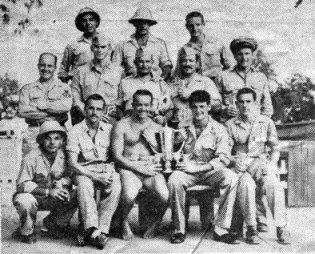 The SEAC team, which piled up many non-winning points to go with a lone first and take the team title.
First row, left to right: Julius Arenstein, James Talmadge, John Booth, Dick Smith, Gerry Peutz; second row: Herman Becker, Gordon Soltan, Fred Wadley, Tom Medicott, Jim Eubank; third row: Gene Ward, Gerry Bennatts, George Haber.
The SEAC team, which piled up many non-winning points to go with a lone first and take the team title.
First row, left to right: Julius Arenstein, James Talmadge, John Booth, Dick Smith, Gerry Peutz; second row: Herman Becker, Gordon Soltan, Fred Wadley, Tom Medicott, Jim Eubank; third row: Gene Ward, Gerry Bennatts, George Haber.
|
 POP WINS BURMA DERBY
POP WINS BURMA DERBY
S/Sgt. Pat Bean, skipper of the Delhi Signals, is not only a good manager but a good recruiter of talent, which fact accounts for the unbeaten record of the winners at Theater Headquarters league on 17 straight triumphs... Bean played as a regular two years with Beaumont in the Texas league and is owned by the Detroit Tigers... His ace pitcher, Cpl. Jim Hubbell, was a Detroit softball star before becoming a G.I. and this year won 15 games, five shutouts and two no-hitters. S/Sgt. E. O. Kletke's .312 average led the hitters and S/Sgt. Milford (Doc) Doerr, of St. Louis, was the league's best outfielder and won a couple of tilts as a relief hurler... The champs get silver trophies soon.
Sparked by the sizzling play of Pfc. Bob Verderber, an ATC team from Karachi recently swept aside an RAF team in an international table tennis match. Other U.S. players were: Pfcs. Dale Trabue, Austen Watson, Royal Smith, and Sgt. Leon Drobiazglewicz... Cpl. Garth Tousey, who beat Babu Lall for the All-Allied boxing championship of the bantam-weight division, appeared on a card before his mates at the 1328th AAF BU last week... Entries for the 12-event field and track meet of the Upper Assam A. and R. Council are rolling in.
Pfc. Glen Teal, of Jacksonville, Fla., led qualifiers in an Assam golf tourney recently with a near-par 71, beating 33 other linksmen... He's expected to win the championship flight with ease. Before joining the Army in 1943, Teal was a golf pro in Florida and one of his earliest assignments placed him at Nassau in the Bahamas where he did P-T work with ATC... He trimmed two strokes off the club course record of 68 there, and after his score was posted, the Duke of Windsor arranged to play with this low-scoring American. They played together many times. Teal is now a radio operator, making regular hops over "the hump."
In a game that was thrilling enough on Sunday to have a play-by-play rebroadcast by Sgt. M. J. Guerrero on Tuesday for the hospital patients unable to attend, the Rangers of 1333rd AAF BU beat the Pillrollers of an Assam general hospital, 6-3. Errors proved costly for the medics in the fifth when the winners scored four times to wipe out a 3-2 edge that had been fashioned through manager Charley Jones' homer.
Early this month there was a unique horse race in Burma, beating the gun on Vinson's order that it was all right to watch the bangtails cavort. This race was rigged up by an American Liaison Group with the Chinese 50th Division. An abandoned C-47 strip, which had been termed "too soft" for planes, was the royal turf over which the nags and their colorful jockeys scampered. This was only 20 miles from the Japs, reveals our informant.
Pvt. Joseph R. (Pop) Ryland celebrated the occasion of a horse race, his first PX ration of beer in a month, and a holiday spirit to spur his mount, Miss Bitch, on to victory, despite the fact she started the race in the same direction as Wrong Way Corrigan or Barney Google's famous Sparkpluf. The horse, with little assistance from the parachute-silk-clad rider, romped home as the longshot underdog. When being congratulated by the commanding officer, after the victory, tipsy-hopsy Pop heard his colonel say: "Ryland, you sure can ride that horse better than you can stand on the ground."
Some of Pop's friends, evidently those who backed him in the pre-race wagering, wrote Roundup of this amazing feat and sent pictures too blurred to print, of Burma's historic Cream of Kentucky Derby.
The Roundup is a weekly newspaper of the United States Forces, published by and for the men in Burma and India, from news and pictures supplied by staff members, soldier correspondents, Army News Service and United Press. The Roundup is published Thursday of each week and is printed by The Statesman in New Delhi and Calcutta, India. Editorial matter should be sent directly to Capt. Floyd Walter, Hq., U.S.F., I.B.T., APO 885, New York, N.Y., and should arrive not later than Saturday in order to be included in that week's issue. Pictures must arrive by Friday and must be negatives or enlargements. Stories should contain full name and organization of sender. Complaints about circulation should be sent directly to Lt. Sidney R. Rose, Hq., U.S.F., I.B.T., APO 885, New York, N.Y. Units on the mailing list should make notification of any major change in personnel strength or any change of APO.

|
MAY 24, 1945
Original issue of India-Burma Theater Roundup shared by CBI Veteran Douglas MacLeod
Copyright © 2009 Carl Warren Weidenburner
TOP OF PAGE PRINT THIS PAGE ABOUT THIS PAGE SEND COMMENTS
PREVIOUS ISSUE CLOSE THIS WINDOW NEXT ISSUE
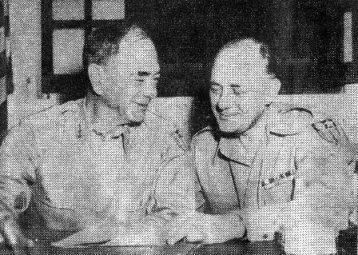 Lt. Gen. Dan I. Sultan, left, has a farewell chat with Maj. Gen. W. E. R. Covell before the SOS chief emplanes
for the United States for an important, undisclosed assignment with the War Department.
Lt. Gen. Dan I. Sultan, left, has a farewell chat with Maj. Gen. W. E. R. Covell before the SOS chief emplanes
for the United States for an important, undisclosed assignment with the War Department.
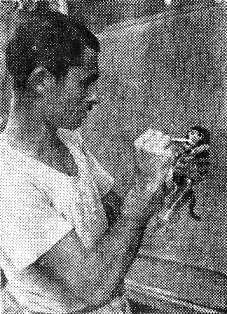
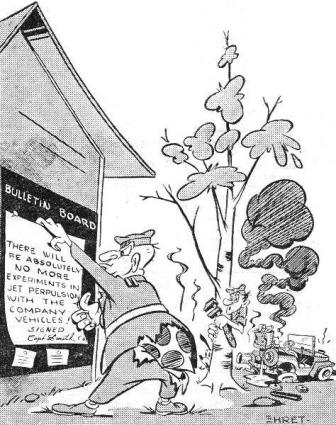 Bulletin Board: "There will be absolutely no more experiments in jet propulsion with the company vehicles."
Bulletin Board: "There will be absolutely no more experiments in jet propulsion with the company vehicles."
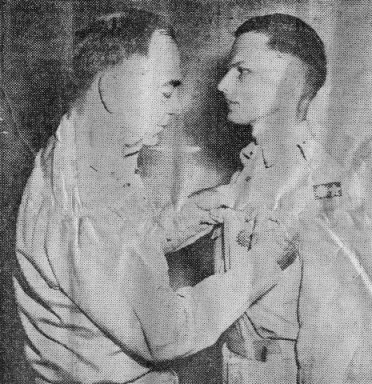 OWI's Charles P. Rockwood receives an Air Medal from Lt. Gen. Dan I. Sultan for 25 combat flights.
OWI's Charles P. Rockwood receives an Air Medal from Lt. Gen. Dan I. Sultan for 25 combat flights.
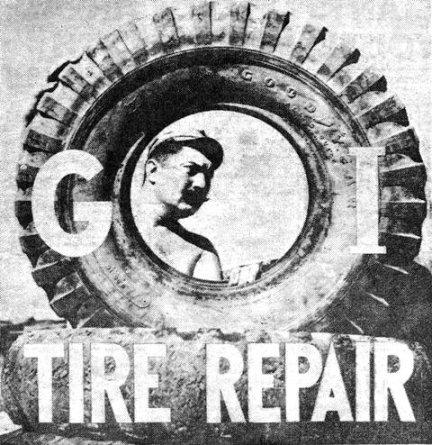 A worn-out Army tire is inspected by S/Sgt. Nicholas J. Malone, of Akron, O. Malone is a member of a G.I. tire
repair unit in India which retreads tires and puts them back on the road for thousands of miles more service.
A worn-out Army tire is inspected by S/Sgt. Nicholas J. Malone, of Akron, O. Malone is a member of a G.I. tire
repair unit in India which retreads tires and puts them back on the road for thousands of miles more service.
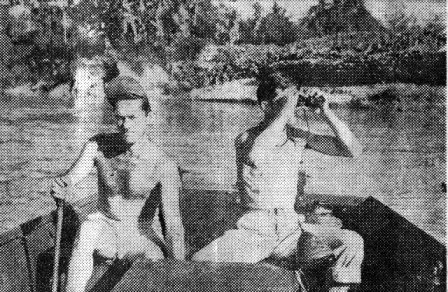 Sgt. William M. Thompson, left, pilots the crash boat while Sgt. David Webb scans the water for a reported crash.
Sgt. William M. Thompson, left, pilots the crash boat while Sgt. David Webb scans the water for a reported crash.
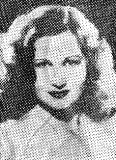 May Mann recently authored an article entitled "I Want To Get Married" in a national magazine. Taking the lovely
lady at her word, a sizeable number of not reticent males have gallantly offered themselves.
May Mann recently authored an article entitled "I Want To Get Married" in a national magazine. Taking the lovely
lady at her word, a sizeable number of not reticent males have gallantly offered themselves.